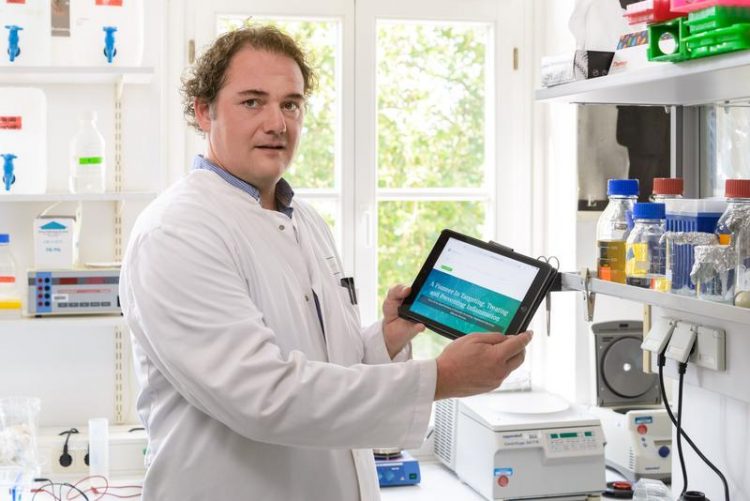New method reformulates pathogens into the body’s allies

Team leader Dr Christian Rüter in the lab FZ / E. Wibberg
Any agreement which entails benefits for both sides is called a win-win situation. This is precisely the result intended for the long-term cooperation and licensing agreement which the Institute of Infectiology at the University of Münster in Germany has now signed with an American biomedical company.
The objective of the collaboration with Innate Biologics in Philadelphia, Pennsylvania, is to improve the possibilities for treating inflammatory skin diseases and autoimmune diseases – and, in the long term, to develop new medications.
The focus is on bacterial effectors – or, more precisely, on a recently discovered approach for immunotherapy. Work is being carried out on a protein family which has been researched by a team led by Dr Christian Rüter and the former Director of the Institute, Prof M. Alexander Schmidt.
Infectology involves investigating how exactly bacteria make their hosts – i.e. human beings – ill. If the immune system combats pathogens such as bacteria, it emits messenger substances which expand the blood vessels. The result is an inflammation. While this is a natural reaction to foreign bodies, bacteria find their own method of manipulating the immune system in humans.
“They now have a large repertoire of ways to deactivate the immune system, and this includes using so-called effectors and toxins,” explains Dr Rüter. Effectors are molecules which lead to a conversion of proteins and, as a result, a change in activity.
This gave the team of researchers an idea: if the effectors were adequately examined, and they could be separated from the actual pathogen causing the illness, they could be used for therapeutic purposes – to combat such inflammations. The Münster researchers are currently investigating an entire “family” of proteins – also known as CPE – which might offer a new possibility for treatment.
“The effectors of the bacteria have a range of very different functions. What we’re especially interested in is cell-penetrating characteristics – meaning that the cell membrane can be penetrated by the effectors,” says Dr Christian Rüter, explaining the method.
The so-called family of bacterial LPX-E3 ligases has been licenced. These are enzymes which act as a catalyst for the transfer of the ubiquitin protein to another protein – in other words, causing the two to bond together. The protein thus marked is bound and removed, so that inflammatory processes in the cell can be deactivated.
With aid of the family of proteins being researched in Münster, it is autoimmune diseases of the skin in particular which can be treated, such as psoriasis and atopic dermatitis. In the case of these diseases, the immune system harms the body which it is actually supposed to defend, and it destroys the body’s own tissue.
This is what the bacterial LPX-E3 ligases – which can penetrate into the cell without any aid and can act intracellularly – are designed to prevent. Instead of acting as a pathogen, the effectors – adapted over many years of evolution – can now be used to benefit the patient.
The aim of the agreement with Innate Biologics is clear: to develop and market new skin therapeuticss and cosmeceuticals. Peter Mondics, the managing director and co-founder of the company, is delighted that the cooperation agreement has been signed. “Our collaboration over the past year has led to a series of clinical findings which point to new types of effective skin biologics – or biopharmaceuticals.
These all have one thing in common: they down-regulate skin inflammatory signalling at the source, and, they are exceptionally patient-friendly.” This research into cosmeceuticals will make an enormous difference for people suffering from age-related skin diseases, and psoriasis says Mondics. Not many treatments are known for such cases, he adds. “This means that this cooperation between Innate Biologics and Münster University is an important USP in a very large market,” he says.
Innate Biologícs is an US company which specializes in the discovery, treatment and prevention of inflammation. The collaboration with Münster University began about a year ago, says Dr. Rüter. “The company approached us, and we didn’t hesitate to respond. And with the help of our faculty’s own Patent and Licensing Office, Clinic Invent, the agreement was ready for signing one year later,” he says.
The project, which began under her predecessor, is now being supported by the new Director of the Institute, Prof Petra Dersch. Other institutes within the Medical Faculty at Münster University are also involved in the cooperation – for example, Prof Karin Loser, Head of “Experimental Dermatology and Immunobiology of the Skin” at the University’s Department of Dermatology, is playing a key role in the project.
Dr Christian Rüter
Institute of Infectiology, University of Münster
Mail: rueterc@uni-muenster.de
Phone: +49 251 83-56477
Media Contact
More Information:
https://www.uni-muenster.de/All latest news from the category: Life Sciences and Chemistry
Articles and reports from the Life Sciences and chemistry area deal with applied and basic research into modern biology, chemistry and human medicine.
Valuable information can be found on a range of life sciences fields including bacteriology, biochemistry, bionics, bioinformatics, biophysics, biotechnology, genetics, geobotany, human biology, marine biology, microbiology, molecular biology, cellular biology, zoology, bioinorganic chemistry, microchemistry and environmental chemistry.
Newest articles

First-of-its-kind study uses remote sensing to monitor plastic debris in rivers and lakes
Remote sensing creates a cost-effective solution to monitoring plastic pollution. A first-of-its-kind study from researchers at the University of Minnesota Twin Cities shows how remote sensing can help monitor and…

Laser-based artificial neuron mimics nerve cell functions at lightning speed
With a processing speed a billion times faster than nature, chip-based laser neuron could help advance AI tasks such as pattern recognition and sequence prediction. Researchers have developed a laser-based…

Optimising the processing of plastic waste
Just one look in the yellow bin reveals a colourful jumble of different types of plastic. However, the purer and more uniform plastic waste is, the easier it is to…



